- Home
- Mollie Cox Bryan
Scrappy Summer
Scrappy Summer Read online
The Cumberland Creek Mystery series by Mollie Cox Bryan:
SCRAPBOOK OF SECRETS
SCRAPPED
DEATH OF AN IRISH DIVA
SCRAPPY SUMMER
Mollie Cox Bryan
Kensington Publishing Corp.
http://www.kensingtonbooks.com
All copyrighted material within is Attributor Protected.
Table of Contents
Title Page
Dedication
Lovey-Dovey Red Velvet Pie Recipe
Ideas for a “Thing” Scrapbook
Acknowledgments
Teaser chapter
Copyright Page
Dedicated to pie lovers everywhere.
Peace. Love. Pie. And scrapbooking.
“Ladies and gentlemen, welcome to the forty-fifth annual Cumberland Creek County Fair Pie Competition,” said Elsie Miller, who stood behind the table.
DeeAnn was cool. She wasn’t worried at all. Her pie was brilliant. It was a delicious, modern twist on an old classic. How could it go wrong? The first part of the contest was just simply watching the judges taste the pies and listening for their reactions. Then they reconvened and announced the winners later in the week, on closing night.
“This first pie is a French silk coconut cream pie made by Macy Freed,” said the head judge, and they all dipped in with their forks, taking morsels of the deep brown, creamy pie. They each took only one bite. From their expressions, the pie was good but not astounding. They sat nodding and smiling politely. She knew those smiles.
DeeAnn had been watching this same group of judges for years. Her eyes found Macy glaring at her. What? Why? What had she ever done to Macy? True, she hadn’t given her that job, but Macy would never have worked out at her bakery. DeeAnn was heading in a hip vegan direction with much of her business, and Macy was not interested. And didn’t even want to learn. That said a lot about her.
A twinge of guilt poked at DeeAnn. She knew the family needed the money. But her decision was a business decision and nothing personal. Still, she could see that Macy might have been taking it very personally.
Her husband elbowed her, and when she looked at him, he grinned. “You’re next?”
She shrugged, Macy’s look of hatred etched in her brain. DeeAnn wanted to be liked. She knew that not everybody could like her, but still it hurt when someone was blatant.
“Next, we have a twist on an apple pie.” DeeAnn’s heart lurched. “Apples and Hearts is the name of the recipe,” said the judge.
DeeAnn wanted to gag. That was not much of a twist—everybody knew about it. You just added red cinnamon hearts to the recipe, and voilà. But it was surprising to hear it was Rachel Burkholder who had entered it. Was she finally losing her touch?
DeeAnn allowed herself even more hope—she figured Rachel was her biggest competition, but not with a recipe like that.
The judges took their bites, made their notes, and moved on. More nods and smiles. Next up was her pie. She was certain. Beads of sweat pricked at her forehead. Her husband, Jacob’s arm went around her.
“Next, we have an entry from DeeAnn Fields, an apple–green chili pie with cheddar and walnut crust,” said the judge, nodding in DeeAnn’s direction with a smile. Oohs and aahs from the crowd.
This could be it, DeeAnn thought. This could be my moment. At last!
The judges took their forks, plowed into the pie, and almost in unison brought their forks to their mouths. DeeAnn felt as if she had stopped breathing. She also felt as if everybody was watching her. Jacob rubbed her shoulder.
She wanted to scream and run and dance around the hall. That was her pie. She thought it was the best one on the table.
“Ackkk!” one of the judges said, spitting it out. Another judge tore up and off the platform, heading straight for the bathroom, but she didn’t quite make it, spitting the bite of pie all over the floor. The remaining judges were in a state of disarray. Red-faced. Spitting. Downing water.
“What? What happened?” DeeAnn stood.
“You tell us, DeeAnn. Take this ridiculous pie and leave,” said Elsie.
“What? I don’t understand. . . .” DeeAnn felt as if she were in the middle of one of those dreams where all of a sudden you were not wearing any clothes. Yes, she felt naked. But something in her forced her to find the strength to hold her head up and walk to the table to grab her entry.
When she turned around, Jacob was standing with his arms out, ready to lead her out the door. Paige, Sheila, Vera, and Annie huddled in the back of the room, then left as the next pie took center stage.
For DeeAnn, it was a blur from that point on.
One week earlier . . .
“I don’t understand it,” Jon said, shrugging. “You used bourbon in your recipe, and so you’re banned for life from entering the competition? Preposterous!”
“I know it,” Beatrice said.
“What kind of idiotic rule is no booze in baking competitions?” he said.
“Welcome to the Bible Belt,” Beatrice said. “We drink only behind closed doors.”
“I just don’t understand,” Jon said. “We drink wine our whole lives.”
“I know, but you’re French. And a sinner,” Beatrice said and cackled.
“Mmm. But I love to sin,” he said and leaned over to kiss her.
The morning was the kind that made Beatrice glad to be alive. She and Jon sat on her back porch, ate breakfast, and took in the view of their new swimming pool, which they had used almost every day since it was built. What a chore getting it built had been, especially after the contractors kept finding things in their backyard. Things of historical significance, like a trunk full of Civil War objects, including a lovely old scrapbook that had once belonged to one of the founding families of Cumberland Creek.
“Ah, well, I’ve lived without being in the darned contest for a few years now. I guess I can carry on. It’s always a Mennonite that wins now. I swear, they are the best bakers on the planet,” Beatrice said and took a bite of her cinnamon scone—one of her favorite breakfast foods. Everybody should have a little cinnamon in their lives.
“You won each time you entered, of course. Your pie is divine,” Jon said and sipped his coffee loudly. It was one of those habits Bea found hard to live with at times, that loud slurping noise. But most of the time she shrugged it off—the benefits of having a man around, especially Jon, far outweighed the annoyances. Most of the time.
They had been together for almost a year, after meeting in Paris and having an affair. Beatrice had thought they had a fling with no future, given that he lived in Paris and she in Cumberland Creek, Virginia, in the middle of the Shenandoah Valley. But he had surprised her by showing up on her doorstep, and they’d lived together ever since. Some residents in Cumberland Creek thought it sinful for them to live together without being married, even at their ages. Bea was eighty-three and Jon seventy-one. Neither one of them gave it a second thought. In fact, their sinfulness was a running joke between them.
“Of course,” she said. “Now, DeeAnn is another matter.”
“What do you mean?”
“It’s the only category she’s allowed to compete in, because she doesn’t bake and sell pies at her shop, and she’s never won it,” Beatrice said.
“Humph. Pie baking is a talent not everybody is gifted with.”
“Oh, I think she makes a fine pie. It’s more the politics, of course. She’s not from around here, you know. She’s only lived here thirty years or so.” She laughed. “In any case, Vera said she’s obsessed about it.”
Jon laughed. “DeeAnn? Obsessed?”
Beatrice nodded and sat back in her old wicker chair, watched as the hummingbirds came in to the feeder.
“You’re no
t obsessed, are you?” Jon poked at her.
“I wouldn’t say I’m obsessed. But I do have a plan to get back at those uptight pie judges.”
A devilish grin spread across her face.
This year DeeAnn was indeed obsessed about winning the local county fair’s pie competition. Since she did not qualify for other baked goods, because of her bakery—it placed her out because of her professional status in those categories—she obsessed about pie. Heck, her pie was as good as those fancy-assed bakers’ at Pamela’s Pie Palace any day. If she’d had the idea first, DeeAnn could have opened a pie shop instead of a bakery. If there was one thing she knew, it was pie.
Of course, why would she limit herself to just one kind of baked good when a plethora of goodies existed? She thought Pam a bit shortsighted when she opened her place.
But Pamela’s Pie Palace was very successful, proving DeeAnn wrong at every juncture. When Pam had said she wanted to build it outside of town, on the mountain road between Charlottesville and Cumberland Creek, DeeAnn had advised her against it.
“Folks aren’t going to go way out there for a slice of pie,” DeeAnn had said.
Pamela had just shrugged and had done what she wanted, anyway. She always had, from DeeAnn’s understanding.
DeeAnn was not a local, but she’d heard stories of Pam’s upbringing. Her rich daddy had made sure she had everything she wanted. And she’d married one of the wealthiest men in the state of Virginia, Evan Kraft, a horse breeder and racer. So she’d hired an architect and designed the pie wedge–shaped building, lit up like a firecracker against the rough and rugged Virginia mountains.
Still, as Vera pointed out from time to time, you had to hand it to Pamela. She had enough money to be a lady of leisure, sitting at home or shopping or traveling, and never have to lift a finger. Instead, she baked pies. Delicious, inspired pies.
DeeAnn admitted that a bit of friendly competition existed between her and Pamela.
The decision weighed on her: what kind of pie would she make? Fruit would be popular—and it was deceptively hard to make. To have the right texture to your fruit was a challenge: you didn’t want it to be too squishy, nor did you want it to be too firm. And so much depended on the exact ripeness of the fruit. Though DeeAnn loved her fruit pie and made a nearly perfect apple pie, she decided that too many unknown variables existed. She wanted to win the competition.
“Why not a pumpkin pie?” Vera said to her at the last scrapbook crop. “Do something a little fancy with it. Chocolate? Hazelnut?”
“Pumpkin is a little mundane,” DeeAnn replied.
“Oh, now, is it?” Sheila said in a mocking tone. “Excuse me.”
“Now, you know what I mean,” DeeAnn said as she clipped a piece of ribbon. “It doesn’t really show off baking talent. Not like, say, an apple pie.”
“An apple pie?” Annie said. “Really? That one seems pretty simple to me.” She held up a page and eyeballed it.
“Have you ever tried to make one?” Vera asked her.
Annie shook her head.
“If it’s from scratch, it’s tricky getting the texture of the apples just right. You don’t want them overcooked. Nor do you want them undercooked,” DeeAnn said, setting her scissors down on the table, where paper, adhesives, and a variety of embellishments were strewn about. “And, of course, you wouldn’t use canned apples for a pie competition.”
Annie sighed. “I guess I’ll never win that competition.”
“Oh, Annie!” Vera said and laughed.
Everybody knew about Annie’s baking mishaps. She burned almost everything. The trouble with Annie was she tried too hard to be efficient with her time. While she baked, she went off and became engrossed in something else. Usually, it was her writing. More than once the fire department had come racing to her place because of the smoke billowing from her kitchen window.
“Well, you better make up your mind fast,” Vera said. “There’s not much time. When is it? Next week?”
DeeAnn nodded. “If I can find some good apples, I might give the apple pie a try. Maybe dust off my mom’s cheddar-apple pie recipe.”
She thought of her mom, young, setting a slice of the warm cheddar-apple pie in front of her when she was a child. Her mom took great care in everything she baked or cooked. Perfection. Those pies were masterpieces. Could she re-create it?
She frowned as she thought of her mom now. She’d love to call her and get her advice on making the pie, but she was riddled with Alzheimer’s. Some days she seemed pretty lucid; other days it was like trying to talk to a toddler or a perfect stranger. It hurt DeeAnn that she couldn’t be home to take care of her mother, like her sister did. But her sister still lived in Minnesota, where her dad and brothers and sister lived, and they were better able to assess the situation.
Maybe it was worth calling Darlene, her sister, about the pie. Darlene liked to bake.
“What’s on your mind?” Paige interrupted her thoughts as she closed up her scrapbook.
“Oh,” DeeAnn said and waved her off. “I’m just thinking about pie. Thinking about my mom.”
Paige sighed. “Sounds like you should make a visit.”
“Maybe we’ll do that after the holidays this year. I haven’t been home in a while.”
“Why are you so focused on pie these days?” Annie asked as she spread out her scrapbook and ran her hands over the pages.
“This competition is the biggest one at the fair,” Vera said, answering for her. “Well, it has the most cachet. And it’s the only one she can enter.”
“I’m entering a competition, too,” Sheila said.
“What are you up to, Sheila?”
“It’s a digital scrapping competition. I’m designing a whole line of digital products. Paper. Elements. Type. If I win, I get to go on a cruise!”
“Wow,” DeeAnn said. “Maybe I’m in the wrong competition. The prize for the best pie this year is a twenty-five-dollar gift certificate to Walmart.”
It wasn’t just about the prize for Sheila, though.
It was about the designs. If she won this design competition, she could be on her way to a real design career in scrapbooking. Her design career had been cut short when she got out of college because she was pregnant, and her life had taken a decidedly different twist.
At first, it had sufficed to design the babies’ rooms and then fill scrapbooks with photos of them. But every inch of her house was designed to the hilt and redesigned again. And while she loved interior decorating and design, as well as the scrapbooking, she longed for another challenge. With one child in college and another one a junior in high school, and soon heading for college, Sheila felt it was her time.
When she first saw what the big-name scrappers were doing with digital scrapbooking, her heart leaped. It felt like every pore in her body opened and tingled. She loved the freedom of digital design and the lack of scrapbooking clutter, which her basement held.
It struck her then, as it sometimes did, that when she first started out—married, young mother, new scrapbooker—it was all about gathering things, organizing, and displaying. Now she felt encumbered by them, weighted down. Digital design felt freeing.
“Mom, where’s my gym bag?” asked Jonathon, her youngest son, as he walked into the kitchen.
“In your room, on your doorknob. Your lunch is on the counter. Don’t forget, because—”
“I know, I know. You won’t bring it to me at camp.” He leaned over and kissed her. “Bye, Mom. Have a great day.”
Sheila grinned. Time for her run, now that he was out the door. He was her youngest, and the upcoming school year would be his last in middle school. Another was in high school, and one was in college, studying design—be still her beating heart.
Just like every other day in her life, when her shoes hit the sidewalk, Sheila’s mind hit a blessed blank. She no longer thought about her upcoming teacher meetings at the school, the way her scrapbooking business was slowly declining, or the fact that she ha
dn’t seen her husband in a week. She managed while he was off on another trip as a guide through the mountains. No. All of those things left her mind. She turned on her iPod, placed her earbuds in her ears, and took off to the sound of Pink, one of her favorites.
As she ran, she noticed how lovely Beatrice’s garden looked, how the Jenkinses really needed to clean up that front porch, and that Sonny Majors was sneaking out of Becky Feller’s house—out the back door. And Sheila had to wonder if Becky’s husband had been working the night shift.
DeeAnn decided to call Darlene but prepared herself for the guilt trip that she knew was coming.
“Well, hey, DeeAnn,” Darlene said. “Thought you dropped off the planet.”
“Well, if you were worried, you could have picked up the phone,” DeeAnn said. “You have my number, right?” Zing!
“I can’t afford the long distance. You know that. Now that Floyd’s almost retired, we need to be careful. How are you doing? How’s the girls?”
DeeAnn was the mother of two daughters, both studying to be nurses. “They are fine. How about you?”
“Ed’s getting ready for med school.” Darlene always had to try to one-up DeeAnn. She needed to take control of the conversation, or it would turn into one of those “My kids are better than your kids” conversations that left DeeAnn sick to her stomach.
“Hey, Darlene, I’m calling about Mom’s apple-cheddar pie recipe,” DeeAnn said, changing the subject.
“I have it. Don’t you?”
“I do. But have you ever made it before?”
“No. I don’t eat that stuff anymore. Not after I lost all my weight.”
“Hmmm. Okay. I’m making it for a pie competition and just wondered if you had any words of advice for me.”
“Bake it. Don’t eat it. That’s my advice.” The weight issue again. Okay, sure, DeeAnn could stand to lose some weight. But she was pretty happy with herself—um, er, at least until she had conversations with her sister, which left her feeling ashamed and weak. Maybe she should try to diet again.

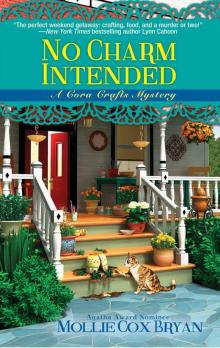 No Charm Intended
No Charm Intended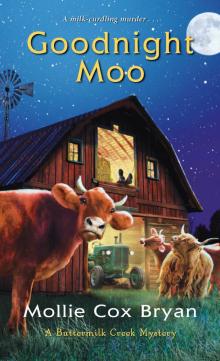 Goodnight Moo
Goodnight Moo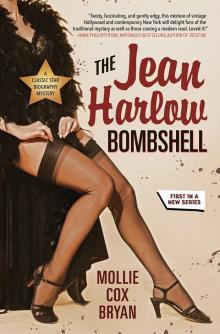 The Jean Harlow Bombshell
The Jean Harlow Bombshell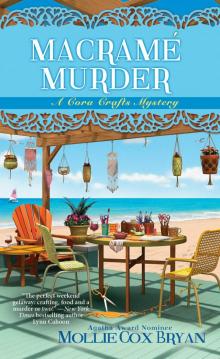 Macramé Murder
Macramé Murder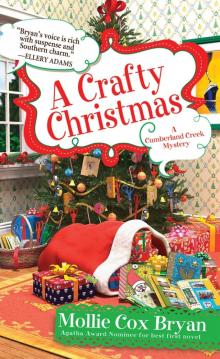 A Crafty Christmas
A Crafty Christmas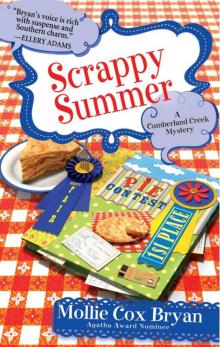 Scrappy Summer
Scrappy Summer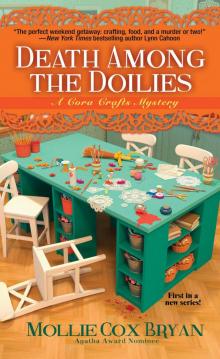 Death Among the Doilies
Death Among the Doilies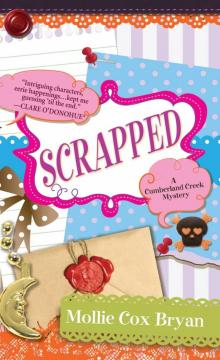 Scrapped
Scrapped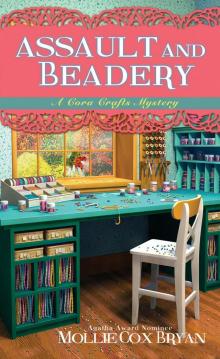 Assault and Beadery
Assault and Beadery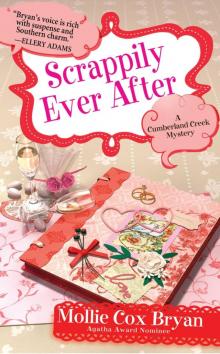 Scrappily Ever After
Scrappily Ever After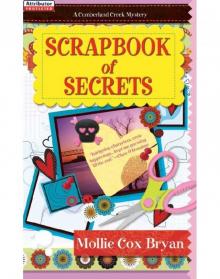 Scrapbook of Secrets
Scrapbook of Secrets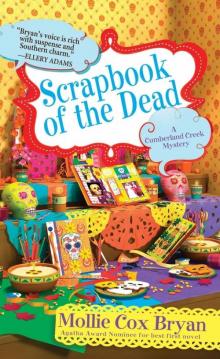 Scrapbook of the Dead
Scrapbook of the Dead